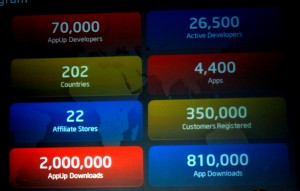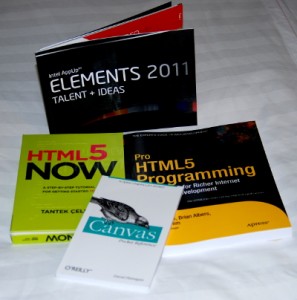Intel admits its Windows app store is a failure, pins hopes on HTML5

By Intel's own admission, its attempt at an app store has been a flop. Even though the company supplies the processors for more than 80% of the PC market, it has barely even scratched the surface at bringing a solid method for software distribution to all those devices it powers.
Intel launched AppUp in 2010, hoping to capitalize on the popularity of netbooks, and to bring some of the success of the popular mobile app store to them.
Today, one year later, netbooks are a thing of the past (Intel has moved on to "Ultrabooks".) and AppUp only has 350,000 registered users.
"I think we've sucked at getting consumers," said AppUp General Manager Peter Biddle. "The most important thing for people writing code is for that code to be used, and this is unambiguously the most important thing for us in the coming year."
But the platforms that Intel has chosen to deliver apps to -Windows and MeeGo- are no longer viable, it seems. With Windows 8, Microsoft is positioning its Windows Marketplace more prominently, and MeeGo is kaput.
Despite this, Biddle says he wants to reach 6 million consumers by next year.
"If we don't do that, you should probably fire me," Biddle joked.

So the question is: how is Intel going to drive an 18x growth in users?
It has come to the same conclusion that many others have come to; that real growth comes from the broad availability of apps in HTML5 and related "Web technologies."
This explains the company's announcement yesterday that MeeGo development is done, and it will be merged into the Web-centric mobile OS project Tizen.
But won't just mean Intel can convert its storefront to HTML5 and let it rip (it's actually already done that.) It means the apps listed in AppUp will be gradually turning into HTML5 as well, to fit in with the Tizen operating system as well as all the other existing platforms whose browsers are slowly picking up support for HTML5 technologies, including Windows, Mac OS, Linux, Chrome OS, iOS, and Android.
So all of Intel's 27,000 registered developers are going to have to pick up some HTML5 skills if they haven't already.

The most depressing thing about this is when you consider the chilling welcome Intel is giving its already loyal developers.
While Google gave out thousands of Android tablets and Chromebooks to all its developers at the Google I/O 2011 conference, Intel's gift to developers today was a stack of books on HTML5 programming.